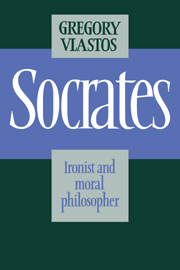Book contents
- Frontmatter
- Contents
- List of additional notes
- Introduction
- 1 Socratic irony
- 2 Socrates contra Socrates in Plato
- 3 The evidence of Aristotle and Xenophon
- 4 Elenchus and mathematics
- 5 Does Socrates cheat?
- 6 Socratic piety
- 7 Socrates' rejection of retaliation
- 8 Happiness and virtue in Socrates' moral theory
- Epilogue: Felix Socrates
- Additional notes
- Bibliography
- Index of passages cited
- Index of names in Plato and Xenophon
- Index of modern scholars
- Index of Greek words
8 - Happiness and virtue in Socrates' moral theory
Published online by Cambridge University Press: 21 October 2009
- Frontmatter
- Contents
- List of additional notes
- Introduction
- 1 Socratic irony
- 2 Socrates contra Socrates in Plato
- 3 The evidence of Aristotle and Xenophon
- 4 Elenchus and mathematics
- 5 Does Socrates cheat?
- 6 Socratic piety
- 7 Socrates' rejection of retaliation
- 8 Happiness and virtue in Socrates' moral theory
- Epilogue: Felix Socrates
- Additional notes
- Bibliography
- Index of passages cited
- Index of names in Plato and Xenophon
- Index of modern scholars
- Index of Greek words
Summary
ARETĒ, EUDAIMONIA: THEIR TRANSLATION
The key terms in the title pose problems of translation. On “virtue” for aretē I need not linger at all, for whatever may be the general usage of this word, Socrates own use of it to designate precisely what we understand by moral virtue must have been apparent throughout this book. Any lingering doubt on this point in my readers' mind may be resolved by referring them to the fact that whenever he brings the general concept under scrutiny – as when he debates the teachability of aretē in the Protagoras and the Meno – he assumes without argument that its sole constituents or “parts” (μόριαμέρη) are five qualities which are, incontestably, the Greek terms of moral commendation par excellence: andreia (“manliness,” “courage”), sōphrosynē (“temperance,” “moderation”), dikaiosynē (“justice,” “righteousness”), hosiotēs (“piety,” “holiness”), sophia (“wisdom”).
“Happiness” for eudaimonia is a more contentious matter. Leading Aristotelians, Ross and Ackrill, have claimed that “well-being” would be a better translation. But in their own translations of the Nicomachean Ethics (hereafter abbreviated to “E.N.”) both stick to “happiness” all the same. It is not hard to see why they would and should. “Well-being” has no adjectival or adverbial forms. This may seem a small matter to armchair translators, philosophers dogmatizing on how others should do the job.
- Type
- Chapter
- Information
- SocratesIronist and Moral Philosopher, pp. 200 - 232Publisher: Cambridge University PressPrint publication year: 1991
- 2
- Cited by



